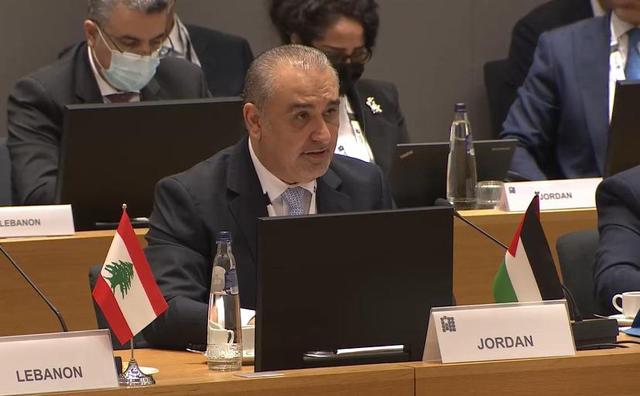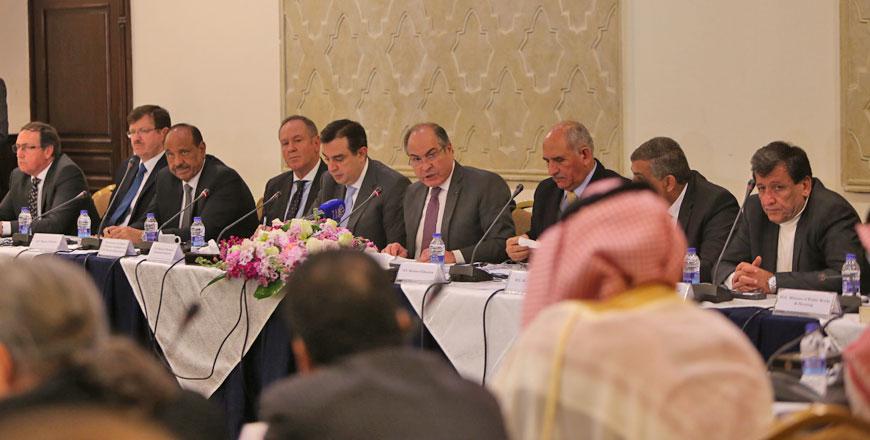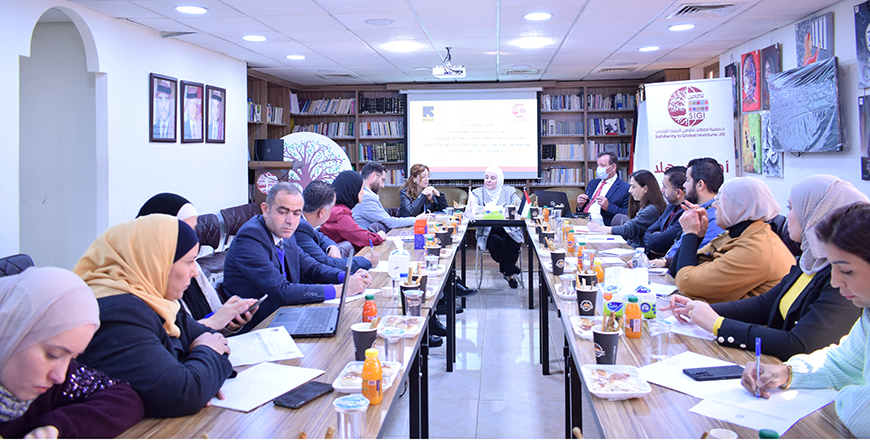You are here
Planning minister urges int’l community to scale up ‘meaningful aid’ to Syrian refugees, host countries
By JT - May 11,2022 - Last updated at May 11,2022

Minister of Planning and International Cooperation Nasser Shraideh addresses the sixth Brussels Conference on 'Supporting the Future of Syria and the Region' on Tuesday (Photo courtesy of Planning Ministry)
AMMAN — Minister of Planning and International Cooperation Nasser Shraideh on Tuesday reiterated the need for the international community to maintain “meaningful and sufficient aid” to Syrian refugees and host countries at the sixth Brussels Conference on “Supporting the Future of Syria and the Region”.
The conference was attended by Josep Borrell, High Representative of the European Union for Foreign Affairs and Security Policy; Janez Lenarcic, the European Commissioner for Crisis Management and Olivér Várhelyi, European Commissioner for Neighbourhood and Enlargement.
The minister pointed to the evolving humanitarian crisis in East Europe, noting that “it is indeed a global responsibility to provide all possible support”, according to the transcription made available to The Jordan Times.
Jordan has done what it could in this regard, sending humanitarian assistance and allowing unrestricted entry for Ukrainians to the Kingdom, he said.
“The resources needed to ensure Ukrainian refugees live in dignity must be provided. And it also remains essential to ensure that Syrians in need in Syria, and refugees in neighbouring countries continue to receive the much-needed attention and support that would enable them not just to survive but to live in dignity,” the minister said.
Shraideh highlighted the importance of working towards sustainable solutions in response to the ever-evolving needs of the Syrian people, including the need to invest in early recovery and resilience building in sectors stipulated in UN Security Council resolution 2585. This pertains to all areas in need in Syria, including in the south.
“Moreover, it is important to scale up support to improve the livelihoods of Syrian refugees and host communities, through investing in multi-year predictable developmental aid programmes that lift some of the burden shouldered by host countries,” Shraideh said.
“A couple of months ago, the Syrian crisis entered its 12th year, still with no end to the crisis in sight. For Jordan, living with the status quo is not an option,” Shraideh said.
The minister called for a collective effort to push forward a political solution in accordance with UNSC Resolution 2254, which seeks to alleviate the humanitarian suffering of the Syrian people, ensure Syria’s unity and territorial integrity, deliver “an enduring defeat” to terrorism.
Alongside this, it aims to lead to the departure of foreign forces, as well as create conditions conducive to the voluntary return of refugees.
The minister reminded the congregation that Jordan is the largest refugee host per capita worldwide.
“We host over 1.3 million Syrians, most of whom reside in cities and towns all around the country, with less than 10 per cent residing in refugee camps. Around 50 per cent of Syrian refugees in Jordan are below 15 years old,” Shraideh said.
The minister highlighted the rising pressures on the Kingdom’s public infrastructure, social services, natural resources, and market.
He also noted that more than 152,000 Syrian students are registered in Jordan’s public schools with 200 public schools working double shifts to accommodate the Syrian children. Moreover, more than 6,000 Syrian refugees are enrolled in Jordanian universities, he added.
Elaborating further, Shraideh said that 2.5 million health services and procedures have been provided to Syrians through Jordan’s public health sector.
“Syrian refugees are provided with the same medical services and care offered to Jordanian citizens. And as you know, our COVID-19 vaccination programme was also inclusive to refugees,” he said.
The planning minister also highlighted Jordan’s water crisis and the impact of migration.
“It is estimated that Syrian refugees have increased the overall demand for water by 21 per cent and an alarmingly high 40 per cent in northern governorates. Future calculations estimate that if Syrian refugees stay in Jordan, by 2045 the expected water demand and wastewater generation will double,” he said.
“This substantial additional demand on our water system drove us to fast-track desalination as the only available option yet expensive for addressing the rising water shortages,” he continued.
The minister said that Jordan has issued around 300,000 work permits to Syrian refugees, “which is more than six times the number of jobs our economy can create on an annual basis, according to pre-COVID statistics”.
For Jordan to continue to be able to host Syrian refugees, support from partners and friends in the international community is key, Shraideh said.
The international community needs to continue to shoulder its share of responsibility towards Syrian refugees. “Refugees cannot be the responsibility of host countries alone,” the planning minister stressed.
“Unfortunately, the dwindling levels of international aid that we have witnessed last year is alarming, and is a continuation of a year after year decline in aid levels to Syrian refugees, which is putting a growing pressure on Jordan’s overstretched budget, resources, and public services,” the minister said.
In 2021, only 30 per cent of Jordan’s plea for support under the Jordan Response Plan (JRP) was covered, which is considered a significant drop when compared to 2019-2020, where the JRP received only 50 per cent coverage, the minister said.
He extended thanks to Jordan’s co-hosts the EU and the UN, as well as all friends and partners from the international community.
“Our work together over the lifespan of the Syrian crisis has been a model for cooperation and building resilience.”
Related Articles
AMMAN — The government and the international community on Thursday endorsed a $7.6-billion three-year Jordan Response Platform (JRP) for the
AMMAN — The Ministry of Planning and International Cooperation has commenced updating Jordan's 2021-2023 Response Plan (JRP) for the Syrian
AMMAN — The Solidarity Is Global Institute (SIGI) on Tuesday held a dialogue session on the “Jordan Response Plan for the Syria Crisis (JRP)













